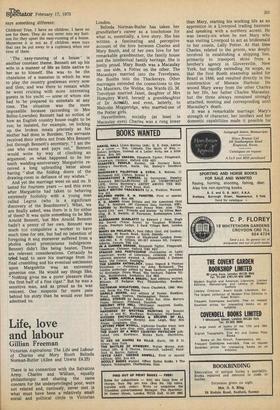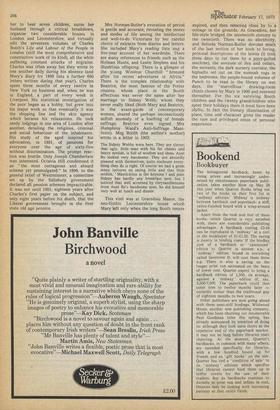Life, love and labour
Gillian Freeman
Victorian Aapirations: The Life and Labour of Charles and Mary Booth Belinda Norman-Butler (Allen and Unwin £4.25) There is no connection with the Salvation Army. Charles and William, equally philanthropic and sharing the same concern for the underprivileged poor, were not related and, curiously, never met in what must have been a relatively small social and political circle in Victorian London.
Belinda Norman-Butler has taken her grandfather's career as a touchstone for what is, essentially, a love story. She has written a fascinating and perceptive account of the love between Charles and Mary Booth, and of her own love for her remarkable grandmother, the family house and the intellectual family heritage. She is justly proud. Mary Booth was a Macaulay on one side, a Potter on the other. The Macaulays married into the Trevelyans, the Booths into the Thackerays. Other marriages extended the connections to the Du Mauriers, the Webbs, the Wards (G. M. Trevelyan married Janet, daughter of Mrs Humphry Ward, herself a granddaughter of Dr Arnold), and even, latterly, to Malcolm Muggeridge, who married one of the Potter girls.
Nevertheless, socially (at least in Macaulay eyes) Charles was a rung lower than Mary, starting his working life as an apprentice in a Liverpool trading business and speaking with a northern accent. He was twenty-six when he met Mary who was visiting Liverpool to act as bridesmaid to her cousin, Lally Potter. At that time Charles, related to the groom, .was deeply involved in establishing a shipping line, primarily to transport skins from a brother's agency in Gloversville, New York, but rapidly extending its scope, so that the first Booth steamship sailed for Brazil in 1886, and resulted directly in the construction of Manaos Harbour. He wooed Mary away from the other Charles in her life, her father Charles Macaulay, but the three always remained strongly attached, meeting and corresponding until Macaulay's death.
It was a remarkable marriage.' Mary's strength of character, her intellect and her domestic capabilities made it possible for her to bear seven children, nurse her husband through a critical breakdown, organise two considerable houses in London and Leicestershire, and virtually edit the seventeen volumes of Charles Booth's Life and Labour of the People in London (still the most comprehensive and constructive work of its kind), all the while suffering constant attacks of migraine. Charles was often away but they wrote to one another daily during his absence (and Mary's diary for 1898 lists a further 680 letters written during that year!). Charles spent three months of every twelve in New York on business and, when he was in England, a part of every week in Liverpool. His statistical investigation of the poor began as a hobby, but grew into his major work so that eventually it was the shipping line and the skin agency which became his relaxations. He took seedy lodgings in one area of London after another, detailing the religious, criminal and social behaviour of the inhabitants. His study of the aged inspired his advocation, in 1891, of pensions for everyone over the age of sixty-five without discrimination. The prompt reaction was hostile. Only Joseph Chamberlain was interested. Octavia Hill condemned it as "the most outrageous and absurd scheme yet promulgated." In 1898, to the general relief of Westminster, a committee ' set up by the Salisbury government declared all pension schemes impracticable. It was not until 1901, eighteen years after Charles's first paper on the subject, and only eight years before his death, that the Liberal government brought in the first state old age pension . Mrs Norman-Butler's evocation of period is gentle and accurate, revealing the mores and modes of life among the intellectual and well-to-do Victorians by her careful choice of extracts from diaries and letters. She included Mary's reading lists and a five-year account of her wardrobe. There are many references to friends such as the Holman Hunts, and Leslie Stephen and his illustrious offspring. There is a glimpse of lhe young Winston Churchill "bronzed after fis recent adventures in Africa." There is the complex relationship with Beatrice, the most famous of the Potter cousins, whose place in the Booth affections was never the same after her marriage to Sidney Webb, whom they never really liked (Both Mary and Beatrice, in the avant-garde of contemporary women, shared the perhaps unconsciously selfish anomaly of a loathing of female suffrage. Beatrice even signed Mrs Humphrey Ward's Anti-Suffrage Manifesto). Meg Booth (the author'S mother) wrote in a letter in 1903:
The Sidney Webbs were here. They are clever; that ugly, little man with his fat cheeks and heavy eyelids, is full of wisdom and ideas. Aunt Bo looked very handsome. They are absurdly pleased with themselves, quite cocksure everything they do is right. Of course we had a great many lectures on eating little and that little seldom. 'Mastication is the keynote '! and poor Sidney has hardly any breakfast now, but I noticed that well screened by chrysanthemums from Aunt Bo's handsome eyes, he did himself very well at lunch and dinner.
This visit was at Gracedieu Manor, the neo-Gothic Leicestershire house which Mary left only when the long Booth tenure expired, and then removed close by to a cottage in the grounds. At Gracedieu, her life-style bridged the nineteenth century to the twentieth. There was no electricity, and Belinda Norman-Butler devotes much of the last section of her book to loving, personal descriptions of the lawns (it took three days to cut them by a pony-pulled machine), the avenues of ilex and cedars, the servants, the dark nursery corridor, the hipbaths set out on the numnah rugs in the bedrooms, the purple-bound volumes of Punch to be read in the library on wet days, the 'marvellous' drawing-room chintz chosen by Mary in 1900 and renewed thereafter. For the six surviving Booth children and the twenty grandchildren who spenl their holidays there it must have been idyllic. In fact the literary illumination of place, time and character gives the reader the rare and privileged sense of personal experience.

































 Previous page
Previous page